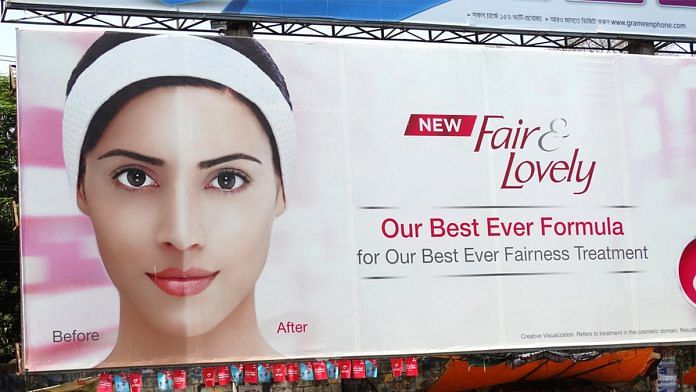New Delhi: Hindustan Unilever Ltd (HUL)’s decision to remove the word ‘fair’ from its Fair & Lovely brand of skin lightening products comes amid the raging controversy over race and the Black Live Matter movement.
Several companies have made similar moves to change branding that has links to negative portrayal of black people, with even TV shows being scrapped from streaming services.
HUL’s move came after it faced backlash for its fairness cream since it propagates the notion that dark skin has less of a social standing than fair skin.
Fairness products from HUL, L’Oréal (OREP.PA) and Procter & Gamble (PG.N), which have dominated the market for decades, have long been criticised for encouraging the negative stereotype against darker-skinned people. Only last week, competitor Johnson & Johnson announced that it would stop selling its line of skin-whitening creams.
ThePrint looks at the origins of the fairness cream and the roaring market in South Asia, especially in India.
Also read: Dropping ‘Fair’ from Fair & Lovely won’t erase Indian racism
History of fairness
The first fairness cream is said to date back to 1919. Created by entrepreneur E.S. Patanwala, it was called ‘Afghan Snow’ and named after King Zahir of Afghanistan who said the white cream reminded him of the snow in the country. According to the company’s website, the First Miss India concert in 1952 was sponsored by Afghan Snow. The product was also endorsed by actress Persis Khambhatta.
In 1975, Fair & Lovely was launched by HUL, the Indian subsidiary of the multinational company Unilever, which became an instant success. Soon, other brands followed.
Advertisements in the 1980s showed dark-skinned women unable to find husbands or jobs until applying fairness creams to achieve the ‘desirable’ skin tone. These storylines continued in advertisements well into the 21st century.
This was despite the Advertising Standards Council of India (ASCI) issuing guidelines in 2014 that prohibited ads from depicting dark-skinned people as disadvantaged or associating any skin tone with any specific kind of socio-economic class, ethnicity or community.
Market size
In 2019, the Indian fairness cream market was reportedly worth nearly Rs 3,000 crore, according to the India Fairness Cream & Bleach Market Overview (2018-2023). Market revenues were expected to reach Rs 5,000 crore by 2023, the study estimated. This is unsurprising considering skin lightening products take up about half of India’s skincare market, according to a 2019 study by the World Health Organization.
Between companies like HUL, P&G and L’Oréal, brands like Nivea, Olay, Pond’s, Dove, Neutrogena and Garnier dominate the industry. This has been boosted by endorsements by a range of celebrities such as Shah Rukh Khan, Deepika Padukone, Virat Kohli and Priyanka Chopra.
Also read: Indian men are swapping ‘tall, dark and handsome’ for ‘tall, fair and debonair’
Good for fairness, bad for skin
The WHO study, which was published last November, highlighted how mercury is commonly found in skin lightening soaps, creams and other products and is hazardous to one’s epidermis and health.
According to the study, the permissible level of the chemical element in skin lightening products is 1 mg/kg (1 parts per million), “yet many cosmetic products contain mercury levels higher than that amount to increase whitening effect”.
The report warns people to look for hazardous ingredients in such products, including “Hg, mercuric iodide, mercury oxide, mercurous chloride, ethyl mercury, phenyl mercuric salts, ammoniated mercury, amide chloride of mercury, mercury iodide”. It also mentions that if a product gives directions to avoid contact with silver, gold, rubber, aluminium and jewellery, “it may also indicate the presence of mercury”.
Since fairness creams involve bleaching skin to achieve a lighter skin tone, products could include harmful ingredients like hydroquinone, mercury, lead, nickel and chromium. Extreme use of these creams can lead to skin damage and thinning of the skin.
Some fairness creams are composed of steroids that can cause skin discolouration, acne, hypersensitivity to sun, pigmentation, skin allergies and even skin cancer.
Also read: Soaps have a dirty history. Even Greeks and Roman didn’t use them to clean their bodies
Changing discourse
In 2009, Women of Worth (WOW), an NGO founded by Kavitha Emmanuel based in Chennai, began an awareness campaign promoting “Dark is beautiful”. The campaign gained more prominence when actor Nandita Das endorsed it with the slogan: “Stay Unfair, Stay Beautiful”.
The campaign was aimed at redefining beauty norms and changing the idea that dark is undesirable.
Actors who previously endorsed fairness creams have come under the radar now for speaking up against race inequality. Among them was actor Priyanka Chopra.
Chopra was criticised on social media after she made an Instagram post in tribute of George Floyd, the African-American man whose death in police custody has led to the latest wave of Black Lives Matter protests.
Priyanka Chopra – Fairness Queen of India. Let’s protest against US racism by ignoring ours. https://t.co/OtMlWpHyII
— Sanjay Pande (@ColSanjayPande) June 2, 2020
Yes hope atleast now celebrities like @iamsrk @mammukka and BLM activist @priyankachopra will now stop promoting fairness products. https://t.co/bqZk4kga3b
— Leo (@4eo) June 25, 2020
Also read: Nandita Das was tired of being called dark and dusky, now she’s fighting against colourism



